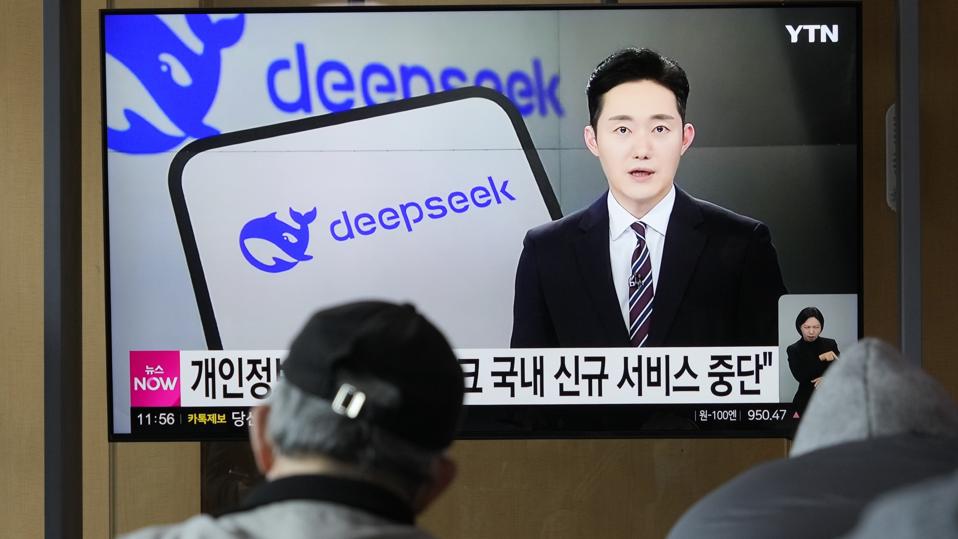Topline
A bipartisan House panel released a report Wednesday accusing DeepSeek of posing a “profound threat” to U.S. national security, alleging the Chinese AI startup harvests user data on behalf of the Chinese government, as efforts to ban DeepSeek have escalated in recent months amid national security concerns.
Key Facts
A report from the House Select Committee on the Chinese Communist Party claims while DeepSeek “presents itself as just another AI chatbot,” the company “siphons” user data for the Chinese government and relies on stolen U.S. technology.
The House panel alleges DeepSeek founder Liang Wenfeng oversees the company in an “integrated ecosystem” with ties to a state-linked hardware distributor and the Chinese research institute Zhejiang Lab.
The panel’s report cites testimony from OpenAI, which told the committee DeepSeek likely relied on “unlawful” techniques to train its AI models and alleged DeepSeek employees “circumvented guardrails” to accelerate development at lower costs, including using OpenAI’s model to help “transform training data.”
DeepSeek “covertly manipulates” search results to align with Chinese propaganda and relied on Nvidia chips that are restricted from export, the House panel claims, though Nvidia has denied this claim, telling CNBC in January that DeepSeek used chips that are “fully export control compliant.”
Neither DeepSeek nor High-Flyer, the hedge fund that backs DeepSeek, immediately responded to requests for comment.
Get Forbes Breaking News Text Alerts: We’re launching text message alerts so you’ll always know the biggest stories shaping the day’s headlines. Text “Alerts” to (201) 335-0739 or sign up here.
Is Deepseek Controlled By The Chinese Government?
DeepSeek is a privately held company, but the startup and Liang have been embraced by the Chinese government, which is usually essential for private businesses to thrive under the country’s communist one-party rule. Liang was among several industry leaders to meet with Chinese President Xi Jinping in February, weeks after meeting China’s Premier Li Qiang. A meeting with Xi marked an apparent approval for the company, as DeepSeek is used by some government offices in China, while Communist Party-backed committees and police departments train workers to use the app, the New York Times reported. The cybersecurity analysis firm Feroot Security told the Associated Press that DeepSeek had hidden code that could send user login information to China Mobile, which the U.S. has banned from operating in the states after citing ties between the company and the Chinese military.
Will Deepseek Be Banned In The U.s.?
The House panel did not recommend banning DeepSeek, and instead suggested the U.S. implement new export guardrails and prohibit the federal government from using China-based AI models. A bipartisan bill banning DeepSeek from federal devices was introduced in the House in February, though it’s not immediately clear whether the measure will be backed by other lawmakers. Other U.S. agencies have restricted access to DeepSeek, including the U.S. Navy, which cited “potential security and ethical concerns” linked to the app, and NASA, whose chief AI officer reportedly expressed national security concerns. Australia banned DeepSeek from government devices, claiming the app posed an “unacceptable risk” to national security, while officials in Italy, Taiwan and South Korea have also moved to ban DeepSeek from government devices.
Key Background
DeepSeek’s generative AI model quickly rose in popularity after its release in the U.S. in January. The company claimed its chatbot outpaced its competitors, including OpenAI’s ChatGPT, and industry analysts speculated DeepSeek ran at a fraction of the cost of its rivals. President Donald Trump called DeepSeek’s release a “wake-up call” for U.S. industries, after it sparked a widespread selloff at the U.S. stock market led by Nvidia’s single-day loss of nearly $600 billion. DeepSeek has drawn criticism over its refusal to answer questions on some controversial topics involving China, including questions about China’s treatment of Uyghurs, Taiwan’s status with China and what happened at Tiananmen Square in 1989.
Further Reading
DeekSeek Launches AI Model Upgrade Amid OpenAI Rivalry—Here’s What To Know (Forbes)

